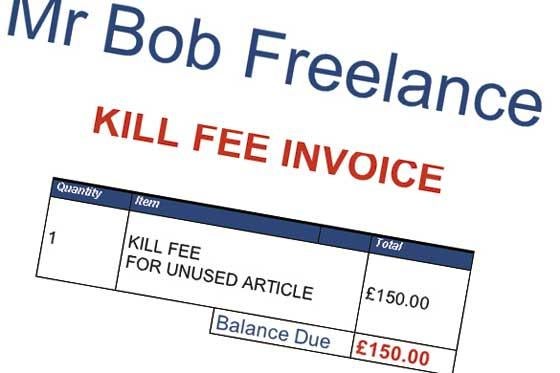
Would you accept a kill fee? I have and probably got more stressed about having done so than I would have by finding the courage to ask for the full amount.
Your head (and bank balance) tells you: ‘You must say no, go on, tell them you want the full amount,’while your heart (and a little nagging voice) counters: ‘Hang on, I’d love to work for this editor again,’or ‘I’m not actually feeling that assertive today.’
So what can you do?
Edinburgh-based freelance Jackie Cosh is typical – with different experiences of kill fees, depending on the circumstances.
‘I’ve been offered a kill fee a few times,’she says. ‘With one magazine, the publication was folding and they had three pieces on hold. I got the full fee. They were a regular client. Another held on to a piece for so long that it no longer fitted in. Again, I got the full fee.
‘I have received half-fees twice. One was a regular client, and it was because the magazine was folding. Paying half was standard practice and I didn’t want to rock the boat as I do a lot of work for them.’
Although she doesn’t always take her own advice, Cosh believes editors should pay full fees. ‘They need to be reminded that the same amount of work goes in, whether the feature is published or not,’she says.
While freelancing for women’s magazines, Catherine Cooper found that certain types of story ‘crash’so often that there’s no point asking for a kill fee for time spent on a piece if that falls through. But if you have filed before the proverbial hits the fan, you can and should still ask for your fee.
‘If I wrote an article and it wasn’t used for no reason other than they had decided not to use it, even though it was up to scratch and in house style and so on, I would expect the whole fee,’says Cooper. ‘I’ve written a couple of pieces which to my knowledge have never been used, and still been paid, without having to negotiate a kill fee. I wouldn’t write for a market which was in the habit of regularly killing pieces for no good reason. If I do the work I expect to be paid.’
Cooper adds that part of the reason real life stories pay so well is because of their sensitive nature, the case studies tend to be volatile. ‘It’s just a risk with that kind of writing,’she says.
Rachael Glazier, co-secretary of the Brighton and mid-Sussex branch of the NUJ, says her advice is not to take a kill fee, as she believes strongly that this has a negative impact on other freelances.
‘Editors need to be reminded that kill fees are not acceptable,’she says. ‘Every time someone accepts a kill fee, it undermines the efforts of other journalists and the unions to ensure that we are paid a proper wage for the work done, not the work published.
‘ I know when money’s tight or you are starting out it is tempting to take whatever you can get, but I think it’s a short-term solution. Can you really afford to keep taking half what you agreed to be paid for your work? And just because you may be able to, can your colleagues afford to work with that kind of uncertainty hanging over them?
‘No one wants to lose a regular client, but is it worth your while to continue working for someone who may pay you less than you agreed?’
Glazier concludes by advising freelances facing this issue to look for other work. ‘I’ve had one editor reduce my fee because she decided to cut a piece for space reasons,’she says. ‘I pointed out this wasn’t acceptable, got the original fee and never pitched to her again. Life’s too short and there are other markets out there. Be polite and move on if necessary.
Linda Jones is the author of The Greatest Freelance Writing Tips in the World
Email pged@pressgazette.co.uk to point out mistakes, provide story tips or send in a letter for publication on our "Letters Page" blog
